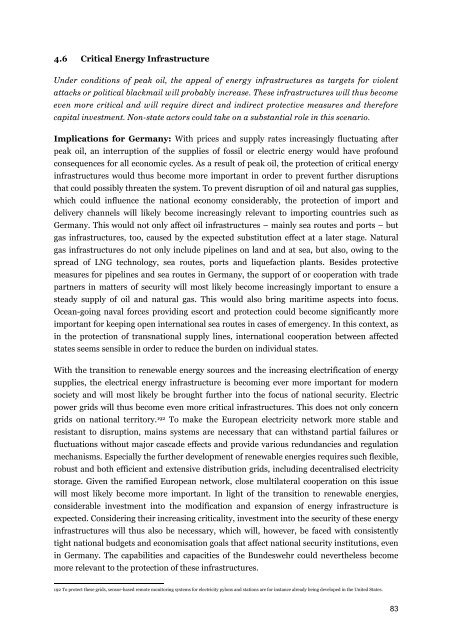PEAK OIL
PEAK OIL
PEAK OIL
Create successful ePaper yourself
Turn your PDF publications into a flip-book with our unique Google optimized e-Paper software.
4.6 Critical Energy Infrastructure<br />
Under conditions of peak oil, the appeal of energy infrastructures as targets for violent<br />
attacks or political blackmail will probably increase. These infrastructures will thus become<br />
even more critical and will require direct and indirect protective measures and therefore<br />
capital investment. Non-state actors could take on a substantial role in this scenario.<br />
Implications for Germany: With prices and supply rates increasingly fluctuating after<br />
peak oil, an interruption of the supplies of fossil or electric energy would have profound<br />
consequences for all economic cycles. As a result of peak oil, the protection of critical energy<br />
infrastructures would thus become more important in order to prevent further disruptions<br />
that could possibly threaten the system. To prevent disruption of oil and natural gas supplies,<br />
which could influence the national economy considerably, the protection of import and<br />
delivery channels will likely become increasingly relevant to importing countries such as<br />
Germany. This would not only affect oil infrastructures – mainly sea routes and ports – but<br />
gas infrastructures, too, caused by the expected substitution effect at a later stage. Natural<br />
gas infrastructures do not only include pipelines on land and at sea, but also, owing to the<br />
spread of LNG technology, sea routes, ports and liquefaction plants. Besides protective<br />
measures for pipelines and sea routes in Germany, the support of or cooperation with trade<br />
partners in matters of security will most likely become increasingly important to ensure a<br />
steady supply of oil and natural gas. This would also bring maritime aspects into focus.<br />
Ocean-going naval forces providing escort and protection could become significantly more<br />
important for keeping open international sea routes in cases of emergency. In this context, as<br />
in the protection of transnational supply lines, international cooperation between affected<br />
states seems sensible in order to reduce the burden on individual states.<br />
With the transition to renewable energy sources and the increasing electrification of energy<br />
supplies, the electrical energy infrastructure is becoming ever more important for modern<br />
society and will most likely be brought further into the focus of national security. Electric<br />
power grids will thus become even more critical infrastructures. This does not only concern<br />
grids on national territory. 192 To make the European electricity network more stable and<br />
resistant to disruption, mains systems are necessary that can withstand partial failures or<br />
fluctuations without major cascade effects and provide various redundancies and regulation<br />
mechanisms. Especially the further development of renewable energies requires such flexible,<br />
robust and both efficient and extensive distribution grids, including decentralised electricity<br />
storage. Given the ramified European network, close multilateral cooperation on this issue<br />
will most likely become more important. In light of the transition to renewable energies,<br />
considerable investment into the modification and expansion of energy infrastructure is<br />
expected. Considering their increasing criticality, investment into the security of these energy<br />
infrastructures will thus also be necessary, which will, however, be faced with consistently<br />
tight national budgets and economisation goals that affect national security institutions, even<br />
in Germany. The capabilities and capacities of the Bundeswehr could nevertheless become<br />
more relevant to the protection of these infrastructures.<br />
192 To protect these grids, sensor-based remote monitoring systems for electricity pylons and stations are for instance already being developed in the United States.<br />
83


